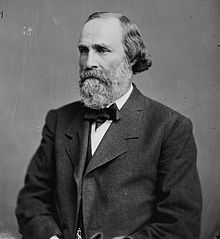Henry Laurens Dawes
| Henry Laurens Dawes | |
|---|---|
 |
|
|
United States Senator from Massachusetts |
|
|
In office March 4, 1875 – March 3, 1893 |
|
| Preceded by | William B. Washburn |
| Succeeded by | Henry Cabot Lodge |
| Member of the U.S. House of Representatives from Massachusetts's 11th district |
|
|
In office March 4, 1857 – March 3, 1863 |
|
| Preceded by | Mark Trafton |
| Succeeded by | District eliminated until 1873 |
|
In office March 4, 1873 – March 3, 1875 |
|
| Preceded by | District reissued in 1873 |
| Succeeded by | Chester W. Chapin |
| Member of the U.S. House of Representatives from Massachusetts's 10th district |
|
|
In office March 4, 1863 – March 3, 1873 |
|
| Preceded by | Charles Delano |
| Succeeded by | Alvah Crocker |
| Member of the Massachusetts House of Representatives | |
|
In office 1848–1849 1852 |
|
| Member of the Massachusetts Senate | |
|
In office 1850 |
|
| Personal details | |
| Born |
October 30, 1816 Cummington, Massachusetts |
| Died | February 5, 1903 (aged 86) Pittsfield, Massachusetts |
| Political party | Republican |
| Alma mater | Yale University |
| Profession | Lawyer |
Henry Laurens Dawes (October 30, 1816 – February 5, 1903) was a Republican United States Senator and United States Representative, notable for the Dawes Act, intended to stimulate assimilation of Indians by ending tribal government and control of communal lands.
Dawes was born in Cummington, Massachusetts in 1816. After graduating from Yale University in 1839, he taught at Greenfield, Massachusetts, and also edited The Greenfield Gazette. In 1842, he was admitted to the bar and began the practice of law at North Adams, where for a time he edited The North Adams Transcript.
In 1869 Dawes became a founding member of the Monday Evening Club, a men's literary society in Pittsfield, Massachusetts. The post-Civil War period was one of founding numerous fraternal and civil societies.
Henry Dawes died in Pittsfield, Massachusetts on February 5, 1903.
Dawes served in the Massachusetts House of Representatives in 1848–1849 and in 1852, in the state Senate in 1850, and in the Massachusetts Constitutional Convention of 1853.
From 1853 to 1857, he was United States district attorney for the western district of Massachusetts. He was elected to the United States House of Representatives in 1856, serving until 1875. During this time, in 1868, he received 2,000 shares of stock in the Crédit Mobilier of America railroad construction company from Congressman Oakes Ames, as part of the Union Pacific railway's influence-buying efforts.
...
Wikipedia
